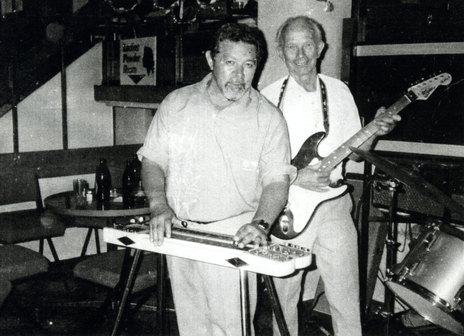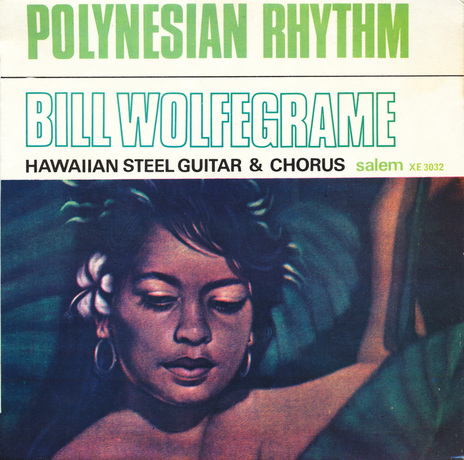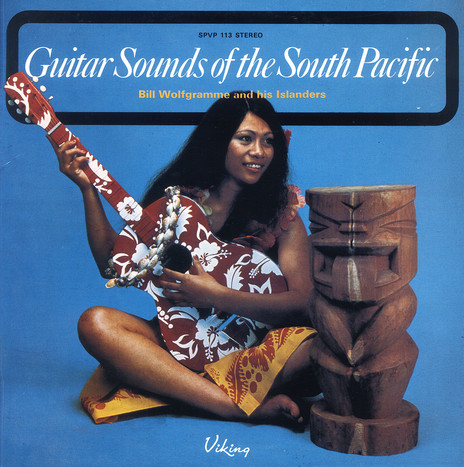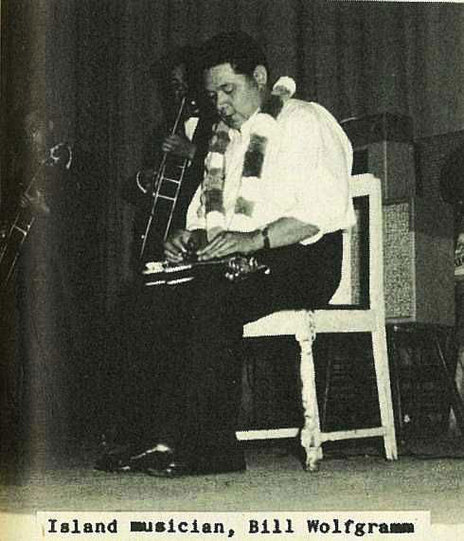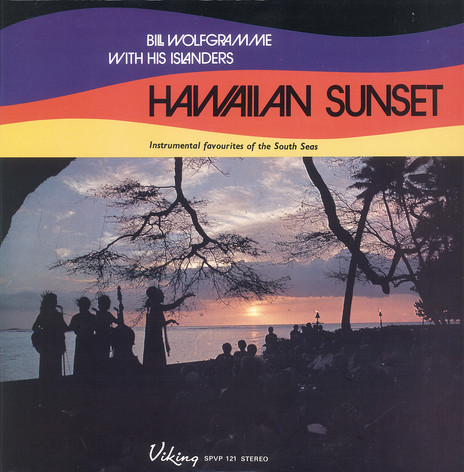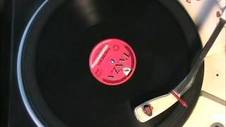The Polynesian Club was on Beresford Street near Karangahape Road. It was a demi-monde frequented by new immigrants, British seamen and music-loving night owls. Among them was promoter Harry M. Miller, who recalled it “... served beer by the keg and was run by a Samoan named Lou Mati. On Sunday nights, The Polynesian was the place where local musicians gathered for jam sessions; the sort of place where, among a good crowd and under the influence of good jazz, you could feel at the centre of a very special world.” Nevertheless, fights among the patrons seemed a weekly occurrence.
In the 1950s, two masters of the lap steel guitar did more than anyone to make the genre widely popular in Auckland. Both were born in Tonga: Bill Wolfgramm and Bill Sevesi. The instrument had been introduced to Tonga courtesy of a Mormon missionary, who left one behind in the 1930s, and a young Tongan, Charlie Sanft, who went to the USA to study in Utah (the home base of the Mormon church) but learnt the steel guitar instead, and returned home to become a prominent player and teacher.
Bill Wolfgramm was born on Vava’u, Tonga, on October 7, 1925. In his teens, he joined a band that included Sanft’s nephew on lead guitar; Wolfgramm played rhythm and ukulele. He picked up the steel guitar aged 19. In a 1986 interview with his friend and rival Bill Sevesi, he said, “When I started learning in Tonga, I copied other Tongan steel guitarists and the steel guitarist Dave Keli’i. When I was in Tonga the news was always Bill Sevesi in New Zealand. We didn’t hear about any other steel guitarists in New Zealand, only Sevesi.”
Settling in Ponsonby
In 1948, aged 23, he emigrated to New Zealand and settled in Ponsonby. He bought a locally made Commodore steel guitar and began to get many gigs around town. By the early 1950s he was part of a radio band broadcasting regularly on 1YA, with Daphne Walker as vocalist. His recording debut was ‘Fijian Holiday’, which Crombie Murdoch wrote to accompany a promo film for a flying-boat service around the Pacific. Credited to Mavis Rivers with Bill Wolfgramm and His Rhythm, it was released on Tanza in 1951.
The cheerful ‘Haere Mai (Everything Is Kapai)’ quickly became a favourite throughout the country.
After a two year stint in Wellington from 1952 – during which he mixed with Mati Hita, a Taranaki-born lap-steel virtuoso who played at Ngati Poneke – he returned to Auckland and was in demand for recording sessions. His best-known release came in 1954 with a song written by Sam Freedman of Wellington. Sung by Daphne Walker, the cheerful ‘Haere Mai (Everything Is Kapai)’ quickly became a favourite throughout the country. In 2000 it was revived in a television advertisement – for the Australian airline Qantas.
Wolfgramm wrote his own arrangements, and as the 1950s progressed he increasingly included local references rather than continuing the mythical connections to Hawaii. He changed the name of his band from the Hawaiians to the Islanders, which was appropriate as his band included Tongans, Samoans, Māori and Europeans. Ironically, their first release as Bill Wolfgramm and His Islanders was ‘Honolulu March’. The band occasionally performed at dances for Queen Salote of Tonga when she visited Auckland.
In 1954, Australian Music Maker magazine singled out Wolfgramm’s Hawaiians as one of the best bands in Auckland. “This band, led by Bill’s confident steel-guitar playing, has a truly professional sound and belongs in the same class as the famous Hawaiian string bands. The outfit has a touch and style which only the players’ Polynesian backgrounds can give, and for tunefulness, beat and continuity they are tops.”
NZ's first pop album
Wolfgramm and His Islanders were responsible for New Zealand’s first pop album, South Sea Rhythm, a 10-inch disc released by Tanza in 1956. It was actually a compilation of 78s recorded earlier by Tanza, many featuring vocalist Daphne Walker. It was quickly followed up by the more locally oriented Melodies of Maoriland, which included tunes such as ‘Haere Mae’, ‘When My Wahine Does the Poi’ and ‘Pania of the Reef’.
All his early recordings were done on his New Zealand-made Commodore eight-string guitar.
Most of Wolfgramm’s 78s were recorded for Tanza, and their titles give an idea of how New Zealand’s Hawaiian-style pop could be idealised, nationalistic, romantic and also humorous: ‘Maori Love Song’, ‘Lovely Hula Girl’, ‘Naughty Naughty Mai Nei’, ‘Lonely Kiwi’, and ‘Hawaiian Cowboy’. Among the songs he recorded with Daphne Walker were ‘Maori Brown Eyes’, ‘An Okey Dokey Hut (’Neath The Co-Co-Coconut Palms)’ and ‘Kumu in a Muumuu’. All his early recordings were done on his New Zealand-made Commodore eight-string guitar, through a Commodore three valve amplifier and a Rola 8-inch speaker.
With the rise of rock and roll, the popularity of Hawaiian-style music tapered off in the dance halls, though Wolfgramm continued recording. A 1960 compilation on HMV, The Musical Moods of Bill Wolfgramm, featured the vocalists Litia Daveta and Millie Bradfield, and he recorded often with his friends and peers on the lap steel guitar, Bill Sevesi and Trevor Edmondson. Late in his career, Wolfgramm said in an interview, “I am enjoying my music and my playing more now. Before, I tried too hard. I needed to. Now, I am more relaxed and I think my playing is better.” Perhaps he was being hard on himself. Those who witnessed Wolfgramm’s many live broadcasts on 1YA remember how calm he remained despite any setbacks such as mysterious hums or musicians who went walkabout.
Boxing on
Wolfgramm didn’t suffer fools, and occasionally got into scrapes with dancers who could be pests, or non-dancers who stood in front of him staring at his playing technique. While his music may have been calming, Wolfgramm himself had a quick fuse and would give short shrift to these annoying members of the audience, or anyone wanting a scrap.
He enjoyed boxing, though not the day he entered a ring to be sparring partner to Tongan boxing champion Kitione Lave. Wolfgramm was surprised when Lave didn’t hold back according to the rules of sparring. Mac McKenzie recalled: “He used Bill as a punching bag, and Bill was not only hurt physically, but his feelings too – that Lave would do that to him when he was only trying to help. It only happened once.”
Wolfgramm was still playing into the early 1990s, occasionally on Fender electric guitars as well as electric steels. He died on September 25, 2003.
